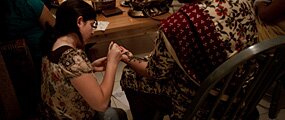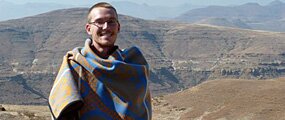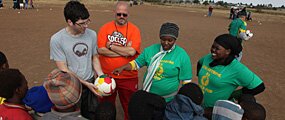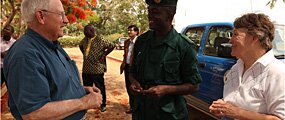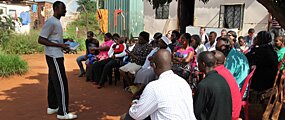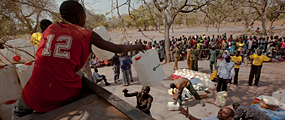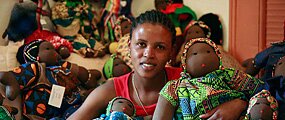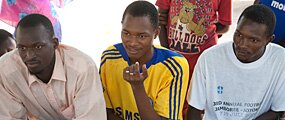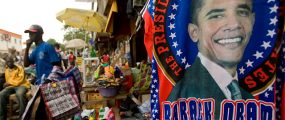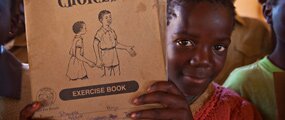A Long Process
Posted August 4, 2010
EASTERN NIGER — For the Hausa people, the decision to follow Christ is a complete shift of mind and heart.
IMB missionary Greg Sharpe, who’s ministered among the Hausa for about five years, says Hausa men are expected to be guardians of Islam. “The societal pressure to stay Muslim — the pressure from dad and the family and the village — can be pretty intense sometimes,” he explains.
However, many Hausa Muslims only have a surface knowledge of their faith.
 “The men think they have a relationship with God, but they really don’t know what it could look like,” Greg says. “…They know Islam is something they’re supposed to do and be, but they don’t have any concept of why they’re doing what they’re doing. They just know that their dad did it and they’re not allowed to change from that.”
“The men think they have a relationship with God, but they really don’t know what it could look like,” Greg says. “…They know Islam is something they’re supposed to do and be, but they don’t have any concept of why they’re doing what they’re doing. They just know that their dad did it and they’re not allowed to change from that.”
Less than 1 percent of the 28 million Hausa, who are spread throughout Niger, Nigeria and other parts of Africa, are followers of Christ. The majority follow Islam, though heavy doses of witchcraft are often intermixed with their Muslim beliefs.
Since late 2009, Greg and his wife, Laura, have served as church planters among the Hausa in a dusty, remote town surrounded by 245 villages that need to hear the Gospel. Before they arrived, there were no missionaries or evangelical churches in the town.
Now, about half a dozen people have made decisions to follow Christ. More originally made the commitment, but have fallen away.
In one village, a man studied Scripture with the Sharpes and expressed interest in following Christ until he found out he would be asked to quit his Islamic prayers and animal sacrifices. He then declared would not leave Islam and asked them to stop sharing Bible stories with him.
“It’s not like it was really even a matter of what was true or not; it was, ‘I’ve invested my life in this and I’m not going to leave it,’” Greg says.
Laura describes the Hausa women as also being “entrenched” in religion, but it’s animism, not Islam. “They say they’re Muslim, but they have more faith in witchcraft.”
“Women have no relationship with God here,” she says. “… They go to the witchdoctor for everything – if they’re sick, if they’re hungry – and they do whatever the witchdoctor says.”
Hausa women buy charms to protect their children from illness, to guard their house against evil spirits, or to attract the attention of men.
 Laura says the women, who are married as young as 12 or 13 to men they don’t know, have no concept of love.
Laura says the women, who are married as young as 12 or 13 to men they don’t know, have no concept of love.
“I’m sharing … that Jesus came for them and died for them with these women who never know love,” she says.
Because the mind shift is so radical, the Sharpes recognize the Hausa need multiple exposures to the Gospel before they can make a decision.
“Jesus is a whole new concept, so it’s not a one time thing,” says Laura. “… It’s almost like walking with them hand in hand through every single thing, and then I think they start to understand that Jesus can change our lives.”
Greg describes their strategy as “personal evangelism and personal relationships.” As they walk through neighborhoods and villages they stop to visit with people, offering to pray for needs and asking if they can share stories from the Bible.
“We try to have stories on hand, so that whenever any kind of situation may arrive, whether somebody’s hungry or whether somebody’s sick, or even if it’s something like the rains coming, [we tell a story about that situation, like] what did Jesus do in the storm?” explains Greg.
Even for those who believe the stories and decide to follow Christ, the mind shift takes time. It’s difficult for Hausa believers to let go of practices ingrained in their culture for centuries.
“My expectations can’t be that the day that they say they believe they push everything else aside,” expresses Laura. “It would be great if they say, ‘I believe and now I don’t need my charms.’ …. But that has to be something that the Holy Spirit helps them with.”
Even fundamental Christian practices, like prayer, are foreign to these new believers.
“It takes them a little while to get comfortable with the idea that they’re actually sharing with God what they think and what’s on their heart,” Greg says. “They’re used to sitting and listening to someone talk about God for hours on end [in the mosque or Quaranic school] but never actually having to engage with it.”
Just like with those who must be led step by step to the decision to follow Christ, the Sharpes walk hand in hand with those who are now believers.
“The women that are following [Christ] are the ones that come to my house every single day,” says Laura. “Every single day they come and we pray together or we just spend time together or we study from the Bible. … Because their understanding is so not there, it’s almost like every single thing we have to do together.”
The Sharpes’ ministry is supported by Southern Baptists giving to the Cooperative Program and the Lottie Moon Christmas Offering. To give, or to learn how you can serve as a missionary among an unreached people group, visit imb-connecting.
Melanie Clinton is a designer and editor for IMB. She has lived and worked in five African countries.
Follow Us Online!
















